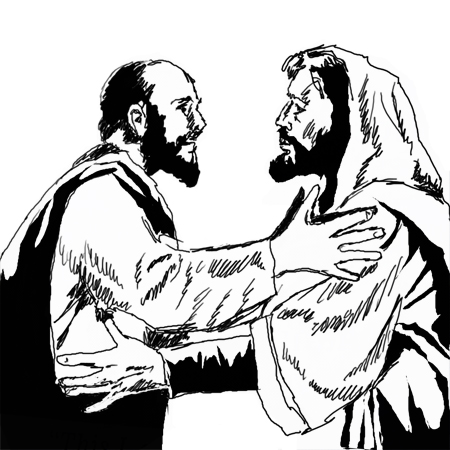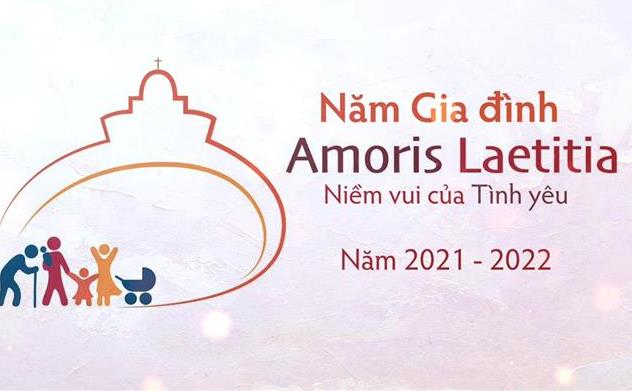 6 Sunday of Easter, Year B
6 Sunday of Easter, Year B
Acts 10:25-26, 31-35, 44-48; 1Ga 4:7-10; Jn 15:9-17
Introduction: This is a homily/Scripture reflection in a book, titled: ‘Every Week God Speaks We Respond’ Cycle B, intended to be published in the future by Reverend John Tran Binh Trong.
It was published in Vietnamese in the US 2008 and republished in Viet Nam 2011. To keep the author’s writing style, this homily has not been edited and may not be by a hired hand. However, if readers would like to point out mistake(s) in spelling and grammar and to suggest English phrases and expressions, it would be greatly appreciated by the author, whose English is not his mother tongue and who did not live in the US until his adulthood. Passive sentences are used intentionally in this context as to avoid using the first personal pronoun ‘I’ when applicable, that might be associated with any idea of egotism, in accord with the French saying, known as: ‘Le moi est haissable’ (The ego is detestable).
Reading the bible, we can see the Gospel of Saint John, the beloved disciple of Jesus, is filled with the word of love. That is why his gospel is called the gospel of love. According to tradition, when Saint John grew old, he preached just one sentence homily saying: Little children, love one another.
This was repeated year after year for a long period. People got tired of it, thinking he might have lost his mind, asking him if he could say something else, different and more interesting. Saint John answered them he would stop speaking of love when they would begin to love one another.
The first letter of Saint John tells us: Whoever is without love, does not know God, for God is love (1Ga 4:8). Because of that love, the gift of the Holy Spirit have been poured out on the gentiles also (Acts 10:45). In the Gospel, Saint John recorded Jesus’ Commandment: As the Father loves me, so I also love you (Jn 15:9). Let us try to find out how Jesus has loved us. We have to limit our talk about his love in today’s Gospel only.
If we talk about what he has done to show his love in the whole Gospel, we do not know how long it might take to talk about it. Jesus has loved us by accepting death on the cross for our redemption. That is what he said in today’s Gospel: No one has greater love than this, to lay down one’s life for one’s friends (Jn 15:13).
To tell someone about our personal or family condition, our feelings and secrets is a sign we trust that person or want to be close to that person and want to open our hearts as to allow that person to enter our lives. That was the way Jesus did in order to become our friend, when he said: I no longer call you slaves, because a slave does not know what his master is doing. I have called you friends, because I have told you everything I have heard from my Father (Jn 15:15). Friends especially close friends are those who care for us and we care for them.
Friends are those who stick with us in happiness and sadness, in success and failure, in health and sickness. Friends are those who are faithful to us and willing to help us. Friends are those whom we can trust. In a feudal and monarchic society, when a young person calls an older person friend, it can be considered insolent.
Jesus is far superior to us, yet he humbled himself to call us friends. Jesus called the apostles, friends and through the apostles, he calls us friends: You are my friends (Jn 15:14).To be in friendship with Jesus - who is God - is a special favor. The question here is: do we really believe that Jesus can be our friend? We can say yes because Jesus said so.
However, to have a personal experience of being Jesus’s friend and to feel his friendship is another story. A certain priest travelled to a certain country, and went to a gift shop and saw a plaque with today’s scripture verse: Remain in my love (Jn 15:9) written on it. That scripture verse was his motto. He bought it with the intention to hang in his office at home. What does it mean to remain in Jesus’ love? When people say a child has lost favor with his parents, we understand a child has offended and hurt his parents. In a similar way, when we sin, we hurt our relationship with God. Thus, to remain in God’s love means to be in favor with God. To remain in God’s love means to have the grace and peace of God. In a talk with young people in a certain parish, a guest priest led them to discuss a question what is happiness.
One group answered: Happiness is when we have a peace of mind. That answer covers the whole meaning of happiness, because if we do not have a peace of mind, we cannot be happy even if we have everything else. To remain in Jesus’ love means to remain in his friendship. The experience of remaining in Jesus’ love and friendship is similar to the experience of love that two lovers have for each other.
Two lovers of the opposite sex always feel close to each other. When they are not with each other, they are still thinking of each other, missing the shadow of his/her love, the whispering voice of his/hers. In other words, they are out of sight, but not out of mind. The experience we have of our love for God and friendship with God is similar to that. To have the experience of our love for God and friendship with God, we will feel his presence in us, beside us and around us.
When eating, working, entertaining and even when sleeping, we still feel his presence. To have this experience, we will not feel something missing; will no longer want to exchange anything for this divine experience. To remain in Jesus’ love means to want to be closer to God, to want to put our trust and faith in God, to want God to be in control of our lives. So how can we remain in Jesus’ love? In today’s gospel, Jesus tells us how to remain in his love: You will live in my love, if you keep my commandments (Jn 15:10). To keep God’s Commandments means to follow his will, to live according to the gospel message. When we have a personal experience of remaining in God’s love and in his friendship, we will find joy in living our faith. If we sin, we will wish to come back to God through the Church to live in his love and friendship again.
A prayer asking Jesus to help us remain in his love:
Oh Jesus, you are God incarnate!
We give you thanks
for having invited us to remain in your love
and to be your friends.
May I experience of how to live in your love
and friendship with you. Amen.
John Tran BInh Trong



 Every Week God Speaks – We Respond, Cycle A was published Online in the US. The introduction of the book is recorded at “Sách của Tác giả Chủ trương, Column 1.
Every Week God Speaks – We Respond, Cycle A was published Online in the US. The introduction of the book is recorded at “Sách của Tác giả Chủ trương, Column 1.

 Năm Mục Vụ Giới Trẻ 2021. HĐGM ấn định một chương trình Mục vụ Giới trẻ 3 năm với các chủ đề tương ứng: Năm 2020: Đồng hành với người trẻ hướng tới sự trưởng thành toàn diện.
Năm Mục Vụ Giới Trẻ 2021. HĐGM ấn định một chương trình Mục vụ Giới trẻ 3 năm với các chủ đề tương ứng: Năm 2020: Đồng hành với người trẻ hướng tới sự trưởng thành toàn diện. Năm Thánh Giu-se: Nhân kỷ niệm 150 năm Đức Giáo hoàng Pio IX chọn thánh Giuse làm Đấng Bảo Trợ Giáo Hội Công Giáo, Đức Phanxicô đã ban hành Tông thư “Patris corde” – Trái tim của người Cha – và công bố “Năm đặc biệt về thánh Giuse” từ
Năm Thánh Giu-se: Nhân kỷ niệm 150 năm Đức Giáo hoàng Pio IX chọn thánh Giuse làm Đấng Bảo Trợ Giáo Hội Công Giáo, Đức Phanxicô đã ban hành Tông thư “Patris corde” – Trái tim của người Cha – và công bố “Năm đặc biệt về thánh Giuse” từ  Năm “Gia đình Amoris Laetitia” 2021 về “Vẻ đẹp và niềm vui của tình yêu gia đình” do Bộ Giáo Dân, Gia Đình và Sự Sống tổ chức, được Đức Phanxicô khai mạc dịp Lễ Thánh Giuse
Năm “Gia đình Amoris Laetitia” 2021 về “Vẻ đẹp và niềm vui của tình yêu gia đình” do Bộ Giáo Dân, Gia Đình và Sự Sống tổ chức, được Đức Phanxicô khai mạc dịp Lễ Thánh Giuse 
